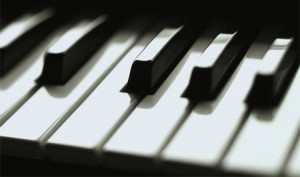
The two Proms from Friday night both employed the piano not as a percussion instrument, but as a weaver of illusions.
In the first concert, Jean-Efflam Bavouzet gave a dazzling performance of Ravel’s often brooding Piano Concerto for the Left Hand, written between 1929-30, in which the piano part is so carefully constructed that, if you’d missed the title of the piece, you could be forgiven for not realising it was written for a single hand. Rather like the single instrumental voice in Bach’s solo partitas for cello and for violin, the single part executes both melody and accompaniment in a way which convinces the ear that there’s another part also involved. Ravel built the piano part so carefully that, when an arrangement was made for both hands, it actually destroyed the careful balancing and textural placing that Ravel had so diligently organised.
The second, late-night Prom saw a very different piano concerto, Morton Feldman’s Piano and Orchestra of 1975, in which the piano explores distilled vertical sonorities, often at times either blending into or emerging out of the accompanying orchestral texture. John Tilbury’s delicately-balanced reading made the piano seem as though it were dripping dabs of colour into the surrounding air. Unlike the traditional concerto, which pitches the solo instrument against the orchestra and includes a solo cadenza to display the virtuosity of the instrument, here piano and orchestra are united in a sonic exploration, defeating time by eschewing the traditional three-movement structure and using instead a slow-moving, metre-less feel over a single movement. The sense of time pausing, of contemplative reflection and of the slow examination of ideas from several perspectives are concepts another Frenchman would have recognised – Satie’s Trois Gymnopédies achieve something similar in condensed form.
Working towards the end of the nineteenth and early twentieth centuries, Debussy talked of composing for the piano a ‘music without hammers.’ The piano is essentially a percussion instrument: rather than strings being bowed or plucked, they are struck with hammers, and you can’t get more percussive than that. It was Debussy who began the idea of treating the piano contrary to its essentially percussive nature, and Feldman’s piece stands in the tradition Debussy began nearly a century earlier.
Two concerts, using the piano to weave two very different illusions: one to overcome the absence of a right-hand (I avoid the word ‘missing,’as the concerto certainly doesn’t suffer from the absence of the upper hand), and one to pretend the piano isn’t a piano at all. Would Debussy have approved of Ravel’s piano concerto, had he lived to hear it ? I feel certain he would have approved of the Feldman.
(You can hear the concerts for a week on-line on BBC iPlayer, and the concerts will be repeated on Radio 3 later next week).
